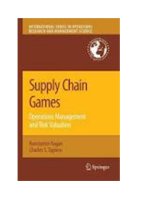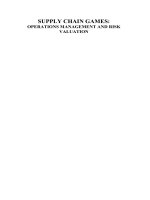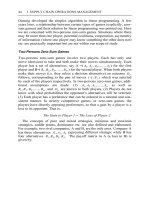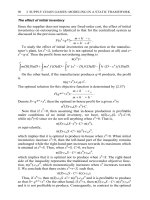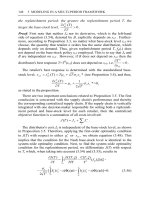Advanced operations management
Bạn đang xem bản rút gọn của tài liệu. Xem và tải ngay bản đầy đủ của tài liệu tại đây (4.07 MB, 450 trang )
FUNDAMENTALS
OF
GLOBAL
OPERATIONS
MANAGEMENT
Second Edition
David Loader
FUNDAMENTALS OF
GLOBAL OPERATIONS
MANAGEMENT
Second Edition
The Securities & Investment Institute
Mission Statement:
To set standards of professional excellence and
integrity for the investment and securities
industry, providing qualifications and promoting
the highest level of competence to our members,
other individuals and firms.
The Securities and Investment Institute is the UK’s leading professional and membership body for practitioners
in the securities and investment industry, with more
than 16,000 members with an increasing number working outside the UK. It is also the major examining body
for the industry, with a full range of qualifications
aimed at people entering and working in it. More than
30,000 examinations are taken annually in more than
30 countries.
You can contact us through our website www.sii.org.uk
Our membership believes that keeping up to date is
central to professional development. We are delighted to
endorse the Wiley/SII publishing partnership and recommend this series of books to our members and all those
who work in the industry.
Ruth Martin
Managing Director
FUNDAMENTALS
OF
GLOBAL
OPERATIONS
MANAGEMENT
Second Edition
David Loader
Copyright # 2006
John Wiley & Sons Ltd, The Atrium, Southern Gate, Chichester,
West Sussex PO19 8SQ, England
Telephone (þ44) 1243 779777
Email (for orders and customer service enquiries):
Visit our Home Page on www.wiley.com
All Rights Reserved. No part of this publication may be reproduced, stored in a retrieval
system or transmitted in any form or by any means, electronic, mechanical, photocopying,
recording, scanning or otherwise, except under the terms of the Copyright, Designs and
Patents Act 1988 or under the terms of a licence issued by the Copyright Licensing Agency
Ltd, 90 Tottenham Court Road, London W1T 4LP, UK, without the permission in writing of
the Publisher. Requests to the Publisher should be addressed to the Permissions Department,
John Wiley & Sons Ltd, The Atrium, Southern Gate, Chichester, West Sussex PO19 8SQ,
England, or emailed to , or faxed to (þ44) 1243 770620
Designations used by companies to distinguish their products are often claimed as trademarks.
All brand names and product names used in this book are trade names, trademarks or registered
trademarks of their respective owners. The Publisher is not associated with any product or
vendor mentioned in this book.
This publication is designed to provide accurate and authoritative information in regard to
the subject matter covered. It is sold on the understanding that the Publisher is not engaged
in rendering professional services. If professional advice or other expert assistance is
required, the services of a competent professional should be sought.
Other Wiley Editorial Offices
John Wiley & Sons, Inc., 111 River Street, Hoboken, NJ 07030, USA
Jossey-Bass, 989 Market Street, San Francisco, CA 94103-1741, USA
Wiley-VCH Verlag GmbH, Boschstr. 12, D-69469 Weinheim, Germany
John Wiley & Sons Australia Ltd, 42 McDougall Street, Milton, Queensland 4064, Australia
John Wiley & Sons (Asia) Pte Ltd, 2 Clementi Loop #02-01, Jin Xing Distripark, Singapore 129809
John Wiley & Sons Canada Ltd, 22 Worcester Road, Etobicoke, Ontario, Canada M9W 1L1
Wiley also publishes its books in a variety of electronic formats. Some content that appears
in print may not be available in electronic books.
British Library Cataloguing in Publication Data
A catalogue record for this book is available from the British Library
ISBN-13 978-0-470-02653-3 (PB)
ISBN-10 0-470-02653-7 (PB)
Project management by Originator, Gt Yarmouth, Norfolk (typeset in 12/16pt Trump Mediaeval).
Printed and bound in Great Britain by T.J. International Ltd, Padstow, Cornwall.
This book is printed on acid-free paper responsibly manufactured from sustainable forestry
in which at least two trees are planted for each one used for paper production.
I wish to dedicate this book to the boys and girls, men
and women who lost their lives in the terrorist attacks
in New York, Washington and Pittsburgh on the
11th September 2001. Many of those totally innocent
people worked in the financial services industry and
made the ultimate sacrifice whilst simply doing their job.
It matters not whether they were colleagues who we
knew: they were our brothers and sisters in a truly
global industry. Their loss and the suffering of their
loved ones will be felt by every one of us, no matter
what part of the industry we work in, for a very
long time.
CONTENTS
Preface
About the author
xiii
xv
1 OPERATIONS MANAGEMENT
1
2 MARKETS
9
Equity securities
14
Debt securities
31
Derivative markets
38
Foreign exchange and money markets
43
Retail and other products
45
Other products
48
Market and product knowledge
49
Market structure and membership
52
Products traded
54
Structure and characteristics of the products
56
viii
CONTENTS
Clearing mechanisms, membership and the
clearing house role
58
Structure of securities clearing and settlement
conventions
60
Regulation, accounting and tax issues
63
Policy, procedures and controls
64
3 BANKING, BROKING AND
INSTITUTIONAL CLIENTS
67
What are the issues for the operations managers
in these scenarios?
4 CONCEPTS OF RISK
72
77
Settlement risk
90
System risk
91
Counterparty and agent risk
93
Personnel risk
95
Regulatory risk
97
Legal risk
98
Reputational risk
99
Infrastructure risk
99
Financial risk
100
Disaster risk
100
CONTENTS
5 CLEARING AND SETTLEMENT
ix
107
Fixed rate bonds
123
Floating rate notes
123
The role of the clearing house
169
The concept of margining, collateral and
treasury management
171
Margin
171
Collateral
180
Treasury management
184
OTC derivatives
187
Products
191
Swaps
192
OTC options
196
Settlement of OTC products
198
Event calendar
202
Communication/Information
203
Other settlement issues
204
Accounting and regulatory issues
206
SwapClear
207
SwapsWire
208
Summary
208
Suggested further reading
210
Checklists
210
x
CONTENTS
6 CUSTODY
215
7 TECHNOLOGY
251
8 REGULATION AND COMPLIANCE
263
Basel II, Sarbanes–Oxley and UCITS Directive
9 CLIENT SERVICES
272
275
The approach to customer relationships and the
‘client culture’
278
Structure of client services within the operations
team
284
Responsibility
284
Measuring performance
286
Escalation procedures
287
Client liaison programmes
288
Front-office client team
289
Industry issues
289
Analysing the competition
290
Developing the service
291
What are the potential problems in customer
relationships?
292
Managing risk within the customer relationship
293
Client visits
295
10 OPERATIONS IN THE FUTURE
297
CONTENTS
xi
Appendices
A UCITS III: INTRODUCTION
303
Aggregate limits
307
Transferable securities and money market
instruments
308
Bank deposits
309
Financial derivatives instruments
310
Funds of funds
312
Index tracking funds
313
Use of subsidiaries
313
Permitted activities of management
companies
314
EU passport for management companies
314
Simplified prospectus
315
Capital adequacy requirements
316
Further investor protection measures
317
B EXTRACTS FROM SARBANES–OXLEY ACT
OF 2002
319
C THE G30 TWENTY RECOMMENDATIONS
339
Creating a strengthened, interoperable global
network
340
Mitigating risk
340
Improving governance
341
xii
CONTENTS
D SOUND PRACTICES FOR THE
MANAGEMENT AND SUPERVISION OF
OPERATIONAL RISK (February 2003)
343
Introduction
344
Background
345
Industry trends and practices
347
Sound practices
349
Developing an appropriate risk management
environment
352
Glossary
373
Useful websites and selected further reading
403
Index
407
PREFACE
In this book I hope to be able to take the reader through
some of the many, many issues and some of the detail
that will be important in a manager or supervisor role.
There will be areas of the book that will not cover subjects in great detail and areas of a vast industry that are
hardly mentioned. Therefore, there are ‘work sessions’
that I suggest will enhance the learning process as you
carry out your research.
The role and responsibilities of supervising and managing an operations team in global markets should not be
underestimated and if you are seeking to take the Securities Institute examinations you will need to work hard
on the additional research suggested.
That said, it is – believe me – well worth while as the
challenges you will face will be real challenges and the
satisfaction of successfully establishing your management style and delivering the objectives set for you
will be great.
Remember always that you never stop learning, lead by
example, listen to others and accept that you are not
always right!
xiv
PREFACE
I wish you well for the future.
Thanks to thedsc.portfolio and Derivative Management
Services Ltd.
March 2006
ABOUT THE AUTHOR
David Loader is actively involved in the international
financial markets as a director of the Derivatives and
Securities Consultancy Ltd, Computer Based Learning
Ltd and Derivatives Management Services Ltd. He has
over 30 years’ experience in the financial services industry, much of the time at senior management level
including operations director within major investment
banks such as Warburg Securities, SBC Warburg and
Warburg Futures & Options Ltd.
David is heavily involved with all three companies of
which he is a director, providing a variety of services
in training and consultancy to a broad base of clients
world-wide. He designs and delivers training courses at
all levels on many areas of the financial markets and, in
particular, those related to operations. He has been
commissioned to deliver programmes to audiences in a
variety of countries for industry organisations – such as
the Singapore Exchanges, the Stock Exchange of
Thailand, the Australian Financial Markets Association
and the Malaysian Exchanges. In addition to his work
for clients in the UK, he has delivered training and
xvi
ABOUT THE AUTHOR
consultancy in centres such as Milan, Prague, Singapore,
Hong Kong, Boston, New York, Bermuda, Mumbai,
Sydney, Johannesburg, Brussels and Frankfurt.
David is Managing Director of the Derivatives and
Securities Consultancy Ltd, an affiliate member of the
Securities and Investment Institute, a member of the
Institute of Directors (IOD) and also a member of
the Guild of International Bankers. Since 1999, David
has been involved in CBL, which has been developed
as a sister company to DMS Ltd. David is the senior
author of CBL’s visUlearn products, which cover the
financial services industry. His practical knowledge of
the financial industry is combined with his unique teaching ability, culminating in the innovative visUlearn
range of multimedia training products.
Chapter
1
OPERATIONS
MANAGEMENT
2
GLOBAL OPERATIONS MANAGEMENT
T
he management of operations in organisations
within the financial services industry is a diverse
challenge. The complexity of today’s financial markets
is reflected not only in the provision of the operational
support and administration functions within major
banks, fund management companies and brokers, but
also in private investment, corporate business and the
administering of the government in many countries.
Trading and investment strategies become ever more
innovative as new products are developed to hedge, speculate, arbitrage and invest. With each new product comes
the need to administer the transaction, to clear and settle
the trades so that the legal ownership is recorded and the
relevant payments made. As the complexity of trading
and investment increases so the demands on the operational teams that support the business grows. And, yet, it
is wrong to assume that the sole function of an operations
team is settlement.
Today there are many specialist functions within the
overall operations remit. Client services, risk management, regulatory, profit generation and retention, and
the marketing/sales of ‘operations’ products. The deregulation of many financial markets around the world has
led to an explosion in transactions not in domestic products but in international products and markets. This
move into cross-border trading is followed by crossborder settlement. The latter is infinitely more complex
than the trading.
Through the 1970s, 1980s and early 1990s, the changes
in the front office environment, particularly the growth
OPERATIONS MANAGEMENT
3
of electronic and telephone dealing, growing international investment, the competitive environment
created by the deregulation, the increase in the volumes
of business and a growing need for greater regulation and
protection for the private investor, all impacted significantly on the operations function. Dematerialised settlement saw less paper in the office, computer systems
became central to the clearing and settlement process,
international securities depositories reduced some of the
problems and risk in settling cross-border trades. Industry
bodies created guidelines for standard messaging formats,
encouraged the use of uniform agreements and advocated
facilities such as dematerialised (electronic book-entry
non-paper settlement), rolling settlement instead of
account settlement and stock lending and borrowing to
help reduce the problems of settlement failing to happen
on the due date.
However, the real catalyst for the dramatic change in the
operations function came with the growth in the use of
products like derivatives where an administrative error or
the failure to pick up on a dealing error could result in six
figure losses, and worse!
Ironically, derivatives were not exactly new instruments,
their origins being back in the Middle Ages. What was
new was the explosion in growth of financial derivatives,
some relatively simple in concept like futures and
options, others much more complex and bespoke.
It would be the combination of a dealer and derivative
products that would ultimately bring about a complete
4
GLOBAL OPERATIONS MANAGEMENT
rethink on the importance of operations, but firms were
also conscious of the need for greater technology to be
available in the support areas to service the burgeoning
business being created in trading and investment. There
were also significant changes taking place in the markets
themselves and particularly in the use of technology.
The London Stock Exchange (LSE) introduced the
Talisman system and later CREST (after a debacle over
another system, Taurus). The London International
Financial Futures and Options Exchange (LIFFE) moved
from open-outcry to electronic dealing through the LIFFE
CONNECTTM system. LIFFE clears through the London
Clearing House (LCH) its derivative products in what is
now a completely electronic process, and both the
London Metal Exchange and the International Petroleum
Exchange, now part of the Intercontinental Exchange
(ICE), also use LCH to clear their trades. (In late 2001
LIFFE announced it had accepted an offer from Euronext,
the combined derivatives exchanges and bourses of
Holland, Belgium and France, and in 2002 became part
of that exchange. Subsequently, LCH and Euronext have
discussed creating the largest pan-European clearing
organisation by linking LCH with Clearnet, the Euronext
clearing house.) In Germany the stock exchange and
derivative exchange clearing have been merged into a
single organisation, Clearstream, that also encompasses
one of the first international central securities depositories, Cedel. Subsequently, Euroclear, another major
international central securities depository, absorbed
SICOVAM, the French depository, and through various
shareholdings is closely linked into Clearnet and Euro-
OPERATIONS MANAGEMENT
5
next. This means that there are two large groupings of
exchanges, clearing houses and depositories in Europe
and, as a result, the streamlining of the clearing and
settlement process is rapidly occurring. Elsewhere, there
are more developments such as the Nordic Alliance,
Portugal’s markets scheduled to be joining Euronext in
2002 and the LSE, having failed to persuade LIFFE to
accept its offer, is talking in earnest with the US
market, Nasdaq.
So much change is of course both creating short-term
problems for operations teams, but generating longer
term a more structured and simplified clearing and settlement process. To illustrate some of the slightly confusing situations that exist and will need to be resolved,
we have:
. LCH, which is talking about linking into Euronext’s
Clearnet, is providing central counterparty clearing
services to CREST for some LSE transactions; however, the LSE is talking about merging with Nasdaq
having seemingly rejected linking to Euronext.
. LIFFE, which has become part of Euronext, is also
linked to Nasdaq to trade share futures contracts via
Nasdaq LIFFE Markets – the first US exchange to list
share futures.
The process of rationalisation, links, alliances, takeovers (many exchanges are switching from being mutual
memberships to publicly quoted companies) and mergers
still has many possibilities and permutations to be played
out.
6
GLOBAL OPERATIONS MANAGEMENT
Change is not confined to Europe. In the Far East the
stock exchanges and derivative exchanges of both Singapore and Hong Kong have joined to create the Singapore
Exchange (SGX) and Hong Kong Exchanges and Clearing
(HKEx). In the US the big three derivative markets, the
Chicago Board of Trade, Chicago Mercantile and Chicago
Board Options Exchange have participated in a joint
venture whilst the New York Mercantile Exchange has
offered to buy the London Metal Exchange.
There is much more going on and changes will continue
to happen around the world for some years to come.
Other influences on the role and structure of operations
have occurred – in particular, the impact of this event
that occurred in the derivatives market.
In 1995, Nick Leeson, a former back office employee who
became a qualified derivatives dealer in the Singapore
office of Baring’s, changed forever the role and profile
of operations.
In the aftermath of the collapse of the bank, it became
clear that operations was not only a very critical means of
risk control over front office activities, but it was also a
major source of risk for a business in its own right.
The need to have independent verification of the trades,
positions and financial movements associated with dealing was not simply administration and bookkeeping.
Fundamentally, it is the key control, reconciling the
actual market situation against the deal records and if
OPERATIONS MANAGEMENT
7
it is inefficient, fails or is non-existent the whole business is put at risk.
Today this role is recognised and, thus, from perhaps a
humble background, operations is now up there alongside the front office. In many of the more enlightened
organisations there is mutual respect for the professionalism of their operations and a realisation that teamwork
is not a cliche´ but a reality for a successful business.
So, the key factors that are changing the role of the
operations team are the changes to the regulatory environment in the UK and elsewhere and the recognition
of operational risk, as we mentioned earlier. On the one
hand, we are looking at more professionalism and qualified personnel in operations teams and, on the other, a
crucial role in the risk management of the business.
Business skills as well as product knowledge are the
requirements of managers and supervisors in today’s
globalised, diverse and ever expanding financial markets
arena. The business skills are to manage budgets, personnel, risk management, and global trading and investment. Above all, the operations manager must be able
to manage time and possess coaching and motivational
skills. Product knowledge is to ensure that the increasingly integrated use of instruments, the development of
systems and critical projects – such as straight through
processing – can be managed successfully in the hurlyburly of daily routines.
To a business in the financial markets an inefficient
operations function is pure risk. A top operations



